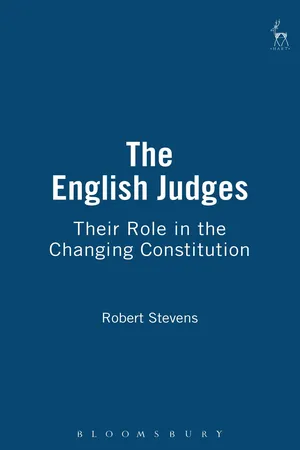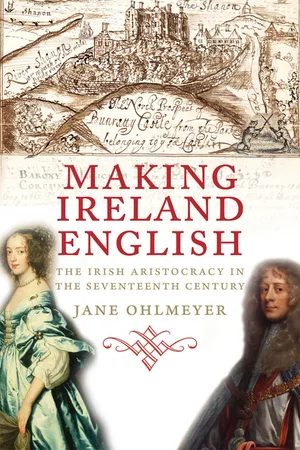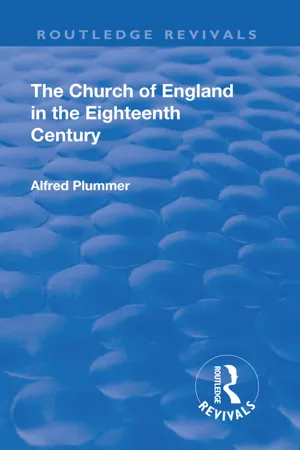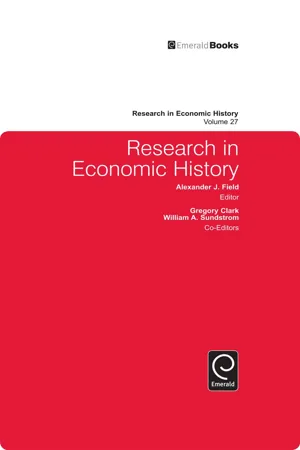Politics & International Relations
Act of Settlement 1701
The Act of Settlement 1701 was a law passed by the Parliament of England to secure the Protestant succession to the throne. It excluded Catholics from the line of succession and established that only Protestant descendants of Sophia, Electress of Hanover, could inherit the throne. The act aimed to prevent a Catholic monarch and ensure the stability of the Protestant establishment in England.
Written by Perlego with AI-assistance
Related key terms
1 of 5
4 Key excerpts on "Act of Settlement 1701"
- eBook - PDF
The English Judges
Their Role in the Changing Constitution
- Robert Stevens(Author)
- 2002(Publication Date)
- Hart Publishing(Publisher)
It received the Royal Assent in June. The Act of Settlement The Act of Settlement was passed with precious little opposition. In the House of Commons only one MP spoke against it and there was no divi-sion in either Commons or Lords. The Protestant succession had been secured. Part of the concern had of course been religious. After all, much of the previous hundred years had seen a series of religious fights, inter-spersed with periods of almost theocratic control, whether it was Charles’ eleven years personal rule in favour of the Church of England or the Puritan control of England by the Dissenters during the Interregnum. There were, however, other factors. Much as the country may have resented William’s continental wars, it feared France and especially Louis XIV—the most Catholic King—even more. Charles II surreptitiously and James II openly were dependent on Louis’ money, while the Parliamentarians’ theory was that they should have sought supply from Parliament. Finally there was an economic base encouraging the Protestant succession. If the seizing of the lands of the monasteries was beginning to fade into the back-ground, government was by then funded through loans and, especially after the founding of the Bank of England in 1694, fiscal stability had become linked with the Protestant succession. It was little wonder that the Act of Settlement sailed through. The Act itself seemed primarily designed to remedy the many perceived defects of the reign of William. Already the English were establishing a rep-utation for chauvinism. After ensuring that, in default of Anne’s offspring, the succession would pass to the Electress Sophia and her heirs providing they were communicating members of the Church of England, Parliament turned its attention to William’s defects. - eBook - PDF
- Jane Ohlmeyer(Author)
- 2012(Publication Date)
- Yale University Press(Publisher)
This was to allow for ‘their better encouragement and the support of the[ir] dignity’. 27 In short, their restoration had become a matter of aristocratic honour. The Politics behind the Land Settlement According to the earl of Orrery, debates over the land settlement divided the Dublin House of Lords into three camps. First were ‘the temporall Lords [who] are either Papists & such as are noe enemie to their interests’ and, second, ‘such Protestants who are not over fond of the Irish’. The third comprised 14 bishops, who ‘are all as one man & true friends to ye Protestant interest’. In terms of numbers the first two groups were equally divided and so the bishops held the casting votes. 28 Predictably, the land settlement domi-nated the Restoration Parliament, especially the later sessions. The Act of Settlement (14 & 15 Charles II, c.2) and the Act of Explanation (17 & 18 Charles II, c.2) were the two principal statutes that regulated the redistribu-tion of land. The former aimed to execute the king’s Declaration and vested in him all land confiscated since 23 October 1641 as a consequence of the rebellion. 29 In all, 226 clauses were incorporated into the Act containing provision for 400 individuals. There were a number of key elements to the Act of Settlement that were of particular relevance to the peers. First, 342 Making Ireland English adventurers and Cromwellian soldiers were confirmed in the land they held on 7 May 1659. Second, the restoration of dispossessed proprietors, princi-pally Catholics, was to be facilitated providing they could prove before a court that they were innocent of having participated in the 1641 rebellion. If successful, the innocent claimants were to be restored to their estates immediately and the Cromwellian occupants were to be ‘forthwith’ reprised (i.e. compensated) with lands of equal value elsewhere. - Plummer Alfred(Author)
- 2018(Publication Date)
- Routledge(Publisher)
CHAPTER IIFROM A .D . 1701 TO THE SILENCING OF CONVOCATION IN 1717T HE turn of the century was marked by some notable events. Chief among these was the passing of the Act of Settlement (12 and 13 William III., c. 2), by which it was enacted “that whosoever shall hereafter come to the possession of this Crown, shall joyn in communion with the Church of England as by Law established.” George, Duke of Gloucester, the only surviving child of the Princess Anne, had died 29th July 1700, at the age of eleven, an event which greatly raised the hopes of the Jacobites. There was some expectation that William III. would marry again. But, when he opened the new Parliament in 1701, he recommended that a Protestant succession should be otherwise secured; and by the Act of Settlement the Electress Sophia and her heirs were placed in the succession. This received the royal assent, 12th June.The feeling against Rome, which thus found very practical expression, was still very strong in Great Britain, and it is a fact which must be kept steadily in view throughout the century. The nation was fully resolved, not merely that it would never again accept Roman jurisdiction, but that it would never again accept a Romanist as its sovereign. Moreover, every Romanist in the kingdom must be rendered impotent. All thoughts, not merely of generosity, but of the most elementary justice, vanished from the minds of the men of that age, when they were confronted with Romanism. The laws against Papists were the worst of all the persecuting laws. They make modern Englishmen ashamed of their forefathers. But in condemning them we must remember the horrible persecutions which Romanists had inflicted on Protestants in almost every country in Europe. Englishmen of that day had not forgotten the plots of Somerville, Throgmorton, Babington, and others, against Elizabeth, nor the more recent Gunpowder Plot. Even where these memories, to say nothing of the fires of Smithfield, had ceased to excite, there were the tyrannical acts of James II., under which thousands of persons still living had suffered. Besides which, the nation was constantly being reminded of the terrible sufferings which Rome still inflicted upon Protestants. Tidings of such things were frequently coming to hand. But far more potent than any diffusion of news were the narratives of the sufferers themselves, who streamed across from the Continent to find a refuge in England. Nearly every large town had its colony of refugees, who had been coming over since the Revocation of the Edict of Nantes, 22nd October 1685. In 1691 Stanhope saw numbers of heretics burned in Majorca. In 1706 Joseph Wilcocks wrote to Burnet and described the burning of four persons at Lisbon in the presence of the King. One woman lived for half an hour in the flames, and one man for an hour. After the Peace of Utrecht (April 1713) England obtained the release of 188 French Protestants from the galleys, where some of them had been for years. In 1717, at Anduze, 77 Protestants were surprised at a meeting, the men sent to the galleys, and the women to prison. In 1745 and 1746, in Dauphiné, 277 Protestants were sent to the galleys. Between then and 1759 ten persons were burned in Spain. Englishmen were never allowed to forget of what atrocities Romanism was capable, when it had a free hand.- eBook - PDF
- Alexander J. Field(Author)
- 2010(Publication Date)
- Emerald Group Publishing Limited(Publisher)
They did not know the personality of the person(s) who would inherit the estates and who would have power over the widow, dependants, and descendants of the individual who established the settlement. Uncertainty about the impact of providing powers to the life tenants and the threat that powers might pose to the interests of the extended family meant that families often favored narrow rather than extensive and/or novel powers in their settlements. Parliament provided a way of overcoming these restrictions through the passage of estate acts. To understand how Parliament emerged in this role we must first review some parliamentary history. 2.2. Political and Parliamentary History Estate legislation formed a key component of the surge in legislative activity that began in the 1690s following some of the most dramatic events in British political history: the Restoration of 1661 and the Glorious Revolution of 1688–1689. In the early 1600s, the Stuart monarchs, King James I and King Charles I, attempted to overturn English political tradition, and impose an absolute monarchy ruling by divine right, rather than a kingship ruling with the consent of the nobility and clergy, as enshrined in the Magna Carta. James I and his son argued with Parliament over taxation, religion, foreign policy, the prerogatives of the monarch, and the limits of royal power. To weaken their Parliamentary opponents, the Stuart monarchs seldom called Parliament into session. Estate Acts, 1600–1830 7 The Stuarts’ attempt to impose personal rule ended when Parliamentary forces defeated the royal army during the Civil War. After the conflict, King Charles I lost his head, and a republican government temporarily reigned. Cromwell’s Protectorate lasted for two decades. In 1661, however, the Stuarts returned to power, and Charles II ascended the throne. During the decades that followed, political instability reemerged.
Index pages curate the most relevant extracts from our library of academic textbooks. They’ve been created using an in-house natural language model (NLM), each adding context and meaning to key research topics.



